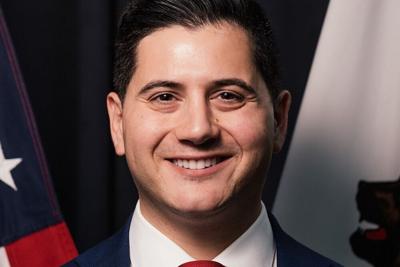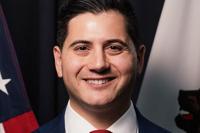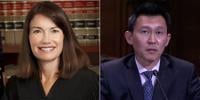
U.S. Attorney Bill Essayli, of the Central District of California
LOS ANGELES - The Federal Public Defender’s Office in Los Angeles has filed a motion to dismiss a felony prosecution and disqualify the current U.S. attorney serving there, Bilal Essayli, based on the provisions of federal law.
The office filed the motion on Aug. 29 in the Central District of California in the case of United States v. Jaime Hector Ramirez. The public defender personnel who filed the motion argue that federal law limits interim U.S. attorneys from serving more than 120 days, adding that Essayli’s “lawful term as the interim U.S. Attorney” in the Los Angeles region ended on July 30.
The government began referring to Essayli as an “acting U.S. attorney” at the time it secured a federal indictment against Ramirez, according to the motion.
“This was a trick because it circumvented limitations that Congress has imposed on temporary service in important federal offices like U.S. attorneys,” the motion states. “The Federal Vacancies Reform Act (FVRA) does not authorize Mr. Essayli’s acting service, because among other problems he is statutorily ineligible.”
The motion also argues that Essayli’s continued service as U.S. attorney in Los Angeles violates the Constitution’s Appointments Clause.
Consequently, Essayli was illegally acting as the U.S. attorney on Aug. 13, when the indictment against Ramirez, a felon charged with possessing a firearm, was obtained.
“And he has no such lawful authority today,” the motion said. “... This court should therefore void and dismiss the indictment with prejudice. The court should also disqualify Mr. Essayli and any attorneys working under his supervision from participating in criminal prosecutions in this district.”
The motion to dismiss the Ramirez case also points out that the federal court in New Jersey concluded that the Trump administration violated the law in the interim appointment of another U.S. attorney, Alina Habba. In that case, the court found that Habba had been exercising the duties of her office with no lawful authority since July 1. In turn, she is ineligible to be an acting U.S. attorney under the FVRA, the court said.
“When an attorney general’s section 546(a) appointment expires, the authority to appoint an interim U.S. Attorney shifts to the judges of the district court under (section) 546(d),” the Public Defender’s Office’s motion states.
The U.S. Attorney’s Office in Los Angeles did not respond to a request for comment.
Professor Anne Joseph O’Connell of the Stanford Law School told the Southern California Record that the motion relating to Essayli could succeed since a similar action was successful in the District of New Jersey.
“This ruling has some holdings specific to U.S. attorneys but also some rulings that apply beyond the U.S. attorney context,” O’Connell said in an email. “If upheld on appeal, I believe this ruling would upend common practice of acting officials under Democratic and Republican administrations.”
The government is expected to appeal the Habba decision and could be successful in challenging the part of the New Jersey court’s opinion dealing with delegation of non-exclusive functions of a vacant office to other people, she said.
“The court did not reach any constitutional issues because of the statutory holdings,” O’Connell added.




